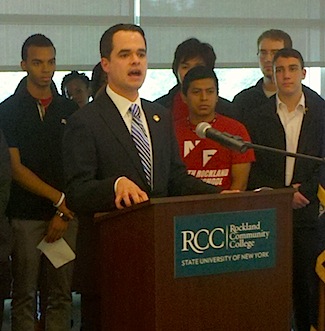 If you are old enough to go to kindergarten, NYS Senator David Carlucci thinks you are old enough to begin saving for college. Carlucci is co-sponsoring legislation to create a pre-pay tuition savings program for SUNY and CUNY schools for future college freshman when they turn five.
If you are old enough to go to kindergarten, NYS Senator David Carlucci thinks you are old enough to begin saving for college. Carlucci is co-sponsoring legislation to create a pre-pay tuition savings program for SUNY and CUNY schools for future college freshman when they turn five.
‘€œRising tuition expenses have become a national phenomenon that is drowning the middle class year after year,’€ says Carlucci. ‘€œThese numbers clearly show an unsustainable path towards paying for college education, and now is the time to offer real solutions so that we can properly invest in our children’s future while doing it at an affordable price.’€ Carlucci’s four point “college affordability plan” would let parents pre-pay one third of the annual total cost of their child’s college education over a period of 12 years before students started their first of college at a State University of New York or CUNY (NYC) school.
Carlucci’s legislation would create two new tax credits and a new student loan program.
Education Tax Credits: Students graduating from NYS schools would be incentivized to stay in New York State under the Under the Stay in New York Tax Credit, which would offer a credit equal to their college expenses over a four-year period up to $3,000 per year. The credit would be available for students who live and work in New York post-graduation, and completed community service while they are attending college.
Tuition Tax Credits would improve New York’s Tuition Tax Credit by:
- Doubling the amount of qualified college expenses that can be claimed from $10,000 to $20,000 over five years
- Doubling the maximum amount of the credit allowed from $400 to $800 over five years; and
- Index the qualified expenses and credit to the rate of inflation of the Higher Education Price Index.
Student Loan Linked Deposit Program: Provide low-cost student loans by authorizing the State Comptroller to place state deposits with participating lenders at a decreased interest rate, in order to offer students reduced rate student loans, at up to 3 points below market rates. Loans would be available for students attending in-state colleges, for educational expenses such as tuition, fees, books, supplies and room and board). Loans would be capped at $7,500 per academic year, and cannot exceed a total amount of $30,000.
The legislation would also create an online resource of lenders who offer the best deals for student loans. The Student Lending Transparency Program would publish a list of private lenders online who provide the best loan rates and repayment options on student loans. Under this program, the Department of Financial Services would be required to collect data on student loans in order to compare loan rates and repayment plans.
Over the last decade, according to the College Board, college costs continued to increase dramatically. At public four-year colleges, costs rose an average of 4.9% per year, at private not-for-profit four-year institutions costs increased an average of 2.7% per year and at public two-year colleges tuition and fees rose an average of 1.8%.
At the same time, public two-year colleges remained the most cost effective. For full-time students enrolled in public two-year colleges, on average, grant aid and tax benefits covered tuition and fee charges in 2011-12, leaving an estimated $810 to help students pay for books, supplies and living expenses. In other sectors, average grant aid and tax benefits did not cover the average cost of tuition and fees.
“We applaud these and any other effective measures ensuring access to higher education at RCC remains attainable for the families of our community,” said Dr. Cliff L. Wood, President of Rockland Community College.








